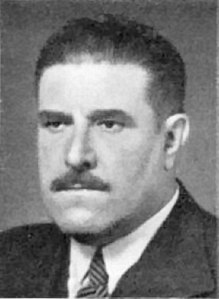Alfred Rosche
Alfred Rosche (* 2. August 1884 in Schluckenau ; † 31 January 1947 in Prague ) was a Sudeten German lawyer, a financial expert, politician ( NSDAP ) and SA leader who, after the annexation of the Sudetenland to the German Reich in Nazi Reichstag moved .
Life
Rosche grew up in a merchant family and had at least eight siblings. After the completion of upper secondary school career, he studied from 1906 jurisprudence at the University of Graz and Prague. In March 1911 he received his doctorate as Dr. jur. Then he was a trainee lawyer at the Higher Regional Court and the Regional Court in Graz . Between 1912 and 1914 he worked as a lawyer in Schluckenau. After completing his military training, he took part in the First World War from 1915 to 1918 as a volunteer in the Austro-Hungarian Army . During the war he was deployed on the Italian front and in the Balkans. Due to a serious grenade injury in June 1916, Rosche was paralyzed for 13 months. Despite his unfit for war, he reported again for military service and received several awards by the end of the war. After the war he was dismissed with the rank of first lieutenant and returned to his homeland. From 1919 to 1920 Rosche worked as a resident lawyer specializing in commercial law in Graz and then in Nixdorf , where he also worked for the steel industry. From 1931 he was a partner in the Nixdorfer knife factory Fenixwerk OHG .
Rosche was active in national associations , including the gymnastics association. As a member of the German National Party (DNP), he was the party's city councilor in Nixdorf. From 1926 to 1938 Roshe was a member of the Parliament of Czechoslovakia in Prague. Initially, from 1926 to 1928, as one of the leading politicians in the German-bourgeois camp, the DNP deputy devoted himself to parliamentary work mainly in the areas of economy and finance. From 1927 to 1928 he was also parliamentary group leader of the DNP in the House of Representatives . Rosche resigned from the DNP after differences over the cooperation of his party with government-related German parties. From 1928 and 1935 he was a member of the newly founded German Economic and Working Group (DWAG), which emerged from splitting off other German parties in Czechoslovakia. He later headed the “Rosche Group” within the party to the Sudeten German Home Front, which was renamed the Sudeten German Party in 1935.
From 1935 Rosche belonged to the SdP and its main leadership and was elected to the Prague House of Representatives for this party in the same year. In 1936 he took over the deputy chairmanship of the party's club of representatives. As a representative of the SdP, Rosche was instrumental in the negotiations with Czechoslovak government representatives on the subsidiary agreements to the Munich Agreement . Even before the annexation of the Sudeten areas to the German Reich , Rosche joined the Sudeten German Freikorps and held the position of intelligence commander there. After the Sudetenland was annexed to the German Reich as Reichsgau Sudetenland , he worked briefly in the Gaupersonalamt of the SdP and the NSDAP. After the supplementary election on December 4, 1938, Rosche became a member of the National Socialist Reichstag for the Sudeten German territories and was a member of this until spring 1945. He became a member of the International Damage Commission to compensate for the settlement between the German Reich and Czechoslovakia as well as the representative of the “Standstill Commissioner” for Sudeten German organizations. In 1942 Rosche reached the rank of Standartenführer in the SA . From March 1939 to 1945 he was President of the Savings Banks and Giro Association for the Sudetenland in Reichenberg.
After the war ended, Rosche was arrested and interned by Czech authorities in Liberec in August 1945. In October 1945 he was transferred to Pankrác prison . He had to answer before the Prague People's Court because of the Republic Protection and Retribution Act. During the procedure, he died of a heart attack .
literature
- Hey Slapnika: Alfred Rosche. In: Austrian Biographical Lexicon 1815–1950 (ÖBL). Volume 9, Verlag der Österreichischen Akademie der Wissenschaften, Vienna 1988, ISBN 3-7001-1483-4 , p. 242.
- Joachim Lilla , Martin Döring, Andreas Schulz: extras in uniform: the members of the Reichstag 1933–1945. A biographical manual. Including the Volkish and National Socialist members of the Reichstag from May 1924 . Droste, Düsseldorf 2004, ISBN 3-7700-5254-4 .
- Joachim Lilla : The representation of the “Reichsgau Sudetenland” and the “Protectorate of Bohemia and Moravia” in the Grossdeutsche Reichstag. In: Bohemia . Journal of the history and culture of the Czech lands. Volume 40, Issue 2, 1999, p. 467.
Web links
- Alfred Rosche in the database of members of the Reichstag
Individual evidence
- ^ A b c Alfred Rosche in the database of members of the Reichstag
- ↑ a b c d Joachim Lilla: The representation of the "Reichsgau Sudetenland" and the "Protectorate of Bohemia and Moravia" in the Grossdeutsche Reichstag . In: Bohemia. Journal of the History and Culture of the Bohemian Lands , Volume 40, Issue 2, 1999, p. 467
- ↑ a b c He. Slapnika: Alfred Rosche . In: Österreichisches Biographisches Lexikon 1815–1950, Volume 9, p. 242.
- ^ A b c Joachim Lilla , Martin Döring, Andreas Schulz: extras in uniform: the members of the Reichstag 1933-1945. A biographical manual. Including the Volkish and National Socialist members of the Reichstag from May 1924 . Droste, Düsseldorf 2004, ISBN 3-7700-5254-4 , p. 523-524 .
| personal data | |
|---|---|
| SURNAME | Rosche, Alfred |
| BRIEF DESCRIPTION | Sudeten German lawyer, financier, politician (NSDAP), Member of the Bundestag and SA leader |
| DATE OF BIRTH | August 2, 1884 |
| PLACE OF BIRTH | Schluckenau |
| DATE OF DEATH | January 31, 1947 |
| Place of death | Prague |
